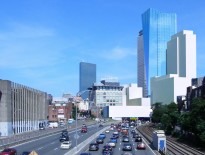A national arts group supplied arts advocates Monday with data about how the creative sector helps drive the Bay State’s economy, and Senate President Stanley Rosenberg said Massachusetts should try to regain its standing as the national leader in arts funding.
The nonprofit arts industry supported 73,288 jobs in Massachusetts in 2015, generating $2.2 billion in economic activity, according to Americans for the Arts President Bob Lynch, who said jobs and the economy are the top agenda items for officials around the country and the new state-specific data can be used to undergird arguments for additional government funding.
Senate President Stan Rosenberg told the News Service Monday he anticipates the Senate “will be doing some overrides on Thursday,” and he is waiting for the Senate Committee on Ways and Means to recommend what specific items to take up.
Earlier this month the House overrode $275 million of the $320 million that Gov. Charlie Baker vetoed from the $39.4 billion fiscal 2018 budget. State tax revenues have fallen short of expectations in recent years, leading to midyear budget cuts and constraints on the state’s spending agenda.
Gov. Baker vetoed $1.8 million in funding for the Massachusetts Cultural Council. The House overrode the veto and the spending would be restored if the Senate does the same.
Massachusetts should spend more per capita on the arts than any other state, as it once did about three decades ago, said Rosenberg, a musician who plays the tuba.
“We have one of the very first cultural councils, and at one time toward the end of Michael Dukakis’s reign as governor, we had the highest per-capita spending in the country from the state budget for the arts. We are working desperately to try to get back to that point,” Rosenberg told a group gathered Monday at Sonos, a home audio company.
In March Rosenberg attended a lobbying event in Washington, D.C., calling for the preservation of federal funding for the arts, and Lynch said “there’s nobody better than Stan Rosenberg” at that type of arts advocacy.
Billed as the launch of a “Arts Means Business” advocacy campaign, Monday’s event brought together Rosenberg, Boston Mayor Marty Walsh and Greater Boston Chamber of Commerce President James Rooney around the importance of the arts in a vibrant economy.
The Barr Foundation has funded studies by the New England Foundation for the Arts, which found there are 310,000 people employed in the “creative economy” in the region, and the Americans for the Arts study, which reported on the state-level data.
Attendance at cultural events in Massachusetts totaled 29.7 million in fiscal 2015, according to the study, which calculated that in addition to any admissions costs, the average event-related spending was $27.32 per person.
“When you think about what this means for our economy, it’s so important that we make an investment, and continue to make the investments – not just on the local level, but we need to make sure we continue to make large investments on the state level, because it does make a big difference,” Walsh said.
Boston and other Massachusetts communities are hoping to woo the online retailer and tech company Amazon, which has solicited proposals around the continent for the location of a second headquarters, dubbed HQ2.
Arts and culture are a selling point for the Boston area, Rooney told the audience.
“We are saying to the world that this city is full of fun, creativity and life,” said Rooney, who said the local arts scene is “critical to our talent retention and attraction strategy.”




 |
| 
